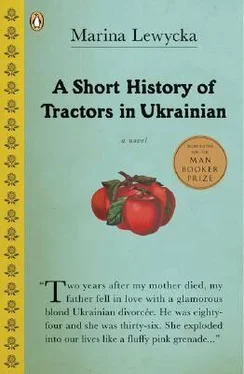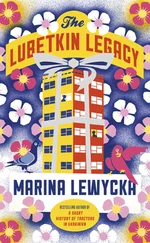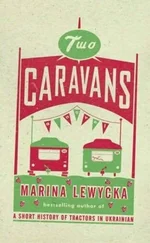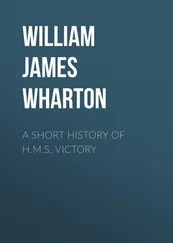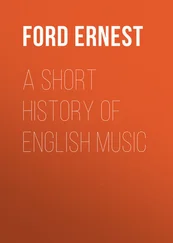I am riven with anxiety. I am consumed with curiosity. And so I put aside two years of bitterness and telephone my sister.
Vera is uncompromising where I am woolly-mindedly liberal. She is decisive where I am wavering.
“Oh my God, Nadezhda. Why didn’t you tell me before? We’ve got to stop her.”
“But if she makes him happy…”
“Don’t be so ridiculous. Of course she won’t make him happy. We can see what she’s after. Really, Nadezhda, why do you always take the side of the criminals…”
“But Vera…”
“You must meet her and warn her to back off.”
I telephone my father.
“Pappa, why don’t I come over and meet Valentina?”
“No no. This is absolutely impossible.”
“Why impossible?”
He hesitates. He can’t think of excuses fast enough.
“She doesn’t speak English.”
“But I can speak Ukrainian.”
“She is very shy.”
“She doesn’t sound shy to me. We could discuss Schopenhauer and Nietzsche.” (Ha ha.)
“She will be working.”
“Well, I could meet her afterwards. After she finishes work.”
“No, this is not the point. Nadezhda, it’s better we don’t talk about this. Goodbye.”
He puts the phone down. He’s hiding something.
A few days later I ring him again. I try a different tack:
“Hi, Pappa. It’s me, Nadezhda.” (He knows it’s me, but I want to sound friendly.)
“Aha. Yes. Yes.”
“Pappa, Mike’s got a couple of days off this weekend. Why don’t we come over and see you.” My father adores my husband. He can talk to him about tractors and aeroplanes.
“Hmm. Tak . That will be very nice. When will you come?”
“On Sunday. We’ll come for lunch on Sunday, about one o’clock.”
“OK. Good. I will tell Valentina.”
We arrive well before one o’clock, hoping to catch her, but she has already gone out. The house looks neglected, dispirited. When my mother was here there were always fresh flowers, a clean tablecloth, the smell of good cooking. Now there are no flowers, but used cups, piles of papers, books, things that have not been put away. The table is bare dark brown formica, spread with newspaper on which some chunks of stale bread and apple peelings are waiting to be thrown away. There is an odour of stale grease.
My father, however, is in great spirits. He has an intense, animated air. His hair, which is now quite silver and thin, has grown long and wispy at the back. His skin has colour and seems firmer, a bit freckled, as if he has been out in the garden. His eyes are bright. He offers us lunch-tinned fish, tinned tomatoes, brown bread, followed by Toshiba apples. This is his special recipe-apples gathered from the garden, peeled, chopped, packed into a pyrex dish and cooked in the microwave (a Toshiba) until they are sticky and solid. Proud of his invention, he offers us more and more and more, and some to take home with us.
I worry-is it healthy to be eating so much out of tins? Is he getting a balanced diet? I check the contents of his fridge and larder. There is milk, cheese, cereal, bread, plenty of tins. No fresh fruit or vegetables, apart from Toshiba apples and some very speckled bananas. But he looks well. I start to make a shopping list.
“You should eat more fresh fruit and vegetables, Pappa,” I say. He consents to cauliflower and carrots. He no longer eats frozen peas or beans-they make him cough.
“Does Valentina cook for you?” I ask.
“Sometimes she does.” He is evasive.
I grab a J-cloth and start to tackle the grime. All the surfaces are covered in dust, and brown sticky patches where things have been spilt. There are books everywhere: history, biography, cosmology, some he has bought himself, some from the public library. On the table in the front room I find several sheets of paper covered with his fine, crabby, spiky handwriting, with many additions and crossings-out. I have to struggle to read hand-written Ukrainian, but I can tell from the way the lines are set out that it is poetry. My father published his first poem at the age of fourteen. It was a eulogy to a new hydro-electric power station that was built on the River Dnieper in 1927. When he was training to be an engineer in Kiev, he belonged to a secret circle of Ukrainian poets, which had been outlawed as part of the drive to impose Russian as the lingua franca of the Soviet Union. I am pleased that he is still writing poetry. I am even a bit proud. I tidy the papers into a neat pile and wipe the table.
In the next room, Mike is slumped in the armchair with his eyes half open and a glass of plum wine in his hand, valiantly maintaining a listening expression on his face, while my father’s voice drones on.
“It is a terrible tragedy what has happened in this beautiful country. The twin evils of fascism and communism have eaten her heart.”
On the wall above the fireplace he has hung a map of Europe. Russia and Germany are scored through with heavy lines, so violently that the paper has been torn. Crude drawings of a swastika, an imperial eagle, and a hammer and sickle are covered with angry scribbles. My father’s voice is raised and trembling as he warms to his climax.
“If I can save just one human being-one human being-from this horror, do you not think this is the moral thing to do?”
Mike mumbles something diplomatic.
“You see, Mikhail,” his voice takes on a confiding, man-toman tone, “a child can have only one mother, but a man can have many lovers. This is perfectly normal. Don’t you agree?”
I strain to hear Mike’s reply, but can catch only a vague mumble.
“I can understand that Vera and Nadia are not happy. They have lost their mother. But they will come to accept when they see what a beautiful type is Valentina.” (Oh will we?) “Of course my first wife Ludmilla was beautiful when I first knew her in youth. I rescued her also, you know. She was under attack from some boys that wanted to steal her skates, and I intervened on her behalf. From that time we became dose friends. Yes, it is the natural instinct of man to be the protector of woman.” (Oh, please! ) “Now, with this Valentina, I am presented with another beautiful woman who appeals for my help. How could I pass by on other side of the road?”
He starts to catalogue the horrors he is saving her from. The talk in the Ukrainian community is of no food in the shops.
The only food is what people grow in their plots-just like the old days, they say. The hrivna has fallen through the floor, and keeps falling every day. There has been an outbreak of cholera in Kharkiv. Diphtheria is sweeping through the Donbass. In Zhitomir a woman was set upon in broad daylight and her fingers chopped off for her gold rings. In Chernigov, trees from the forests around Chernobyl have been felled and turned into radioactive domestic furniture which has been sold all around the country so people are irradiated in their own homes. Fourteen miners were killed in an underground explosion at Donetsk. A man was arrested at the railway station at Odessa and found to have a lump of uranium in his suitcase. In Lviv a young woman claiming to be the second coming of Christ has convinced everybody that the world will end in six months’ time. Worse than the external collapse of law and order is the collapse of any rational or moral principles. Some people run to the old Church, but more run to the new fantasy Churches they are bringing in from the West, or to soothsayers, millenarians, out-for-a-quick-buck visionaries, self-flagellants. Nobody knows what to believe or whom to trust.
“If I can save just one human being…”
“Oh, for goodness’ sake!” I fling the J-cloth at him. It lands wetly in his lap. “Pappa, haven’t you tied yourself up in some ideological knots here? Valentina and her husband were party members. They were prosperous and powerful. They did all right under communism. It isn’t communism she is fleeing from but capitalism. You’re in favour of capitalism, aren’t you?”
Читать дальше
